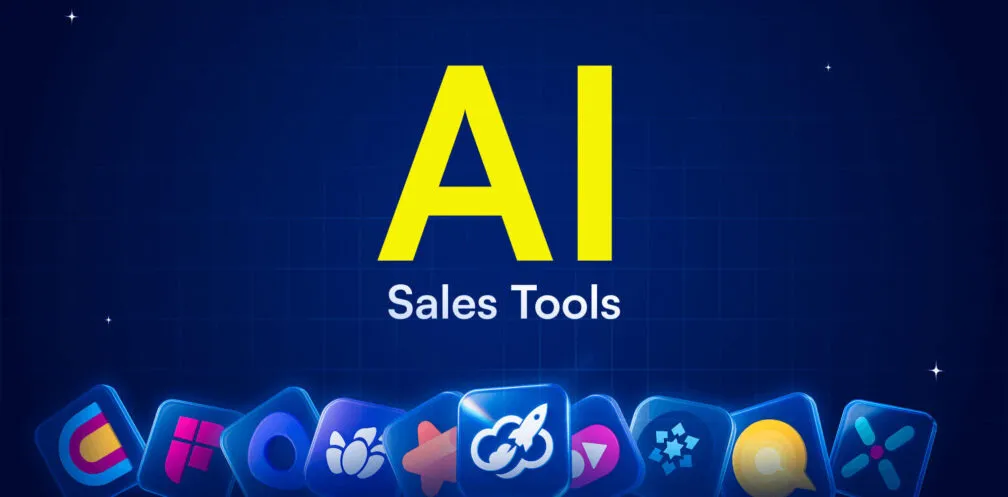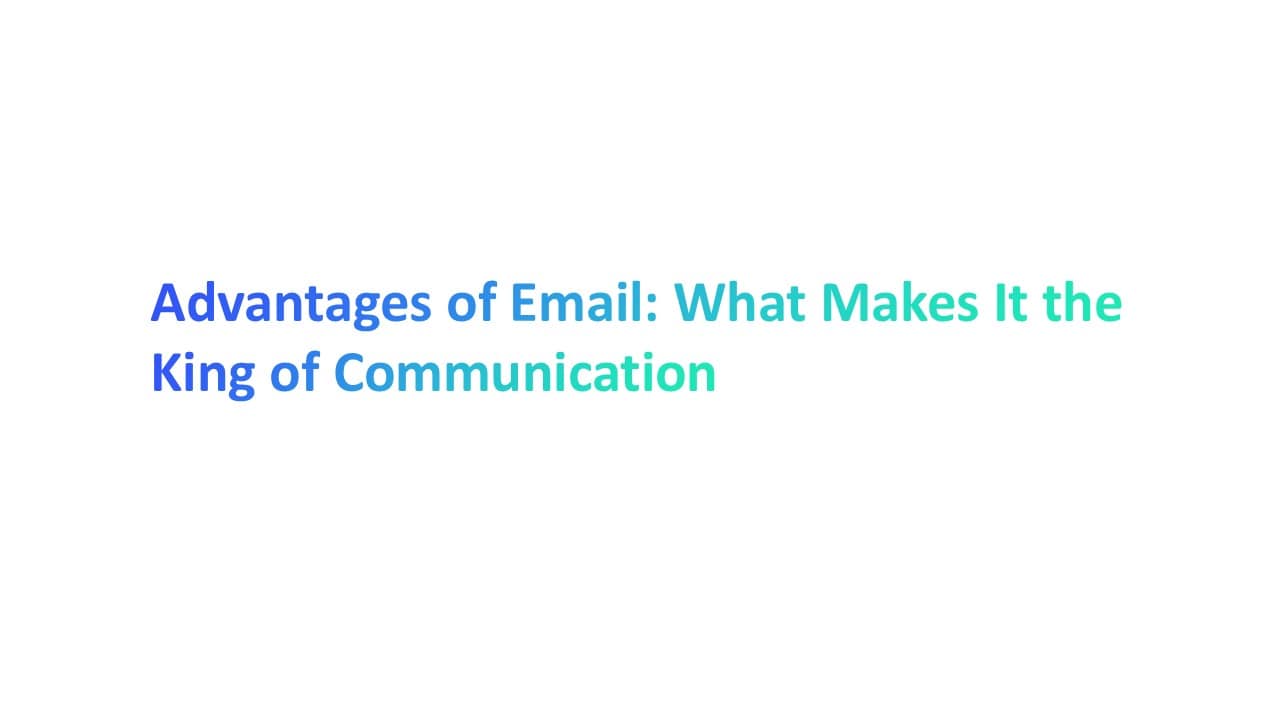The modern B2B buyer is defying the traditional sales stages as they are more informed and expect more from the brands they engage with. In 2026, sales teams will have to operate in a market that’s moving at breakneck speed, where the competition to engage and acquire customers is fierce.
Hence, the manual and generic methods to reach such an informed cohort won’t work in the coming years. AI is no longer a future trend; it’s happening and evolving into a weapon that B2B businesses must leverage to close deals faster and build a steady revenue stream.
From finding the right leads to tracking customer journeys, AI-enabled tools can help sales teams focus on what matters most. In this post, we have a curated list of AI tools that can help salespeople supercharge their sales pipeline and beat the competition.
Why AI Is a Game Changer for Sales
AI in sales is not just about automation; AI is bringing intelligence at scale, allowing sales teams to stay on top of the evolving trends and deliver personalized experiences at the right time.
From predicting which leads are most likely to close to optimizing sales calls, AI is empowering sales teams to make a solid impact on business revenue.
A new generation of AI tools is making these capabilities accessible to sales teams, helping them streamline prospecting, improve customer engagement, and drive smart decisions.
Let’s look at the top tools every sales professional must be aware of and leverage to supercharge their processes.
AI Tools for Smart Lead Prospecting
Finding qualified leads has been at the heart of sales efforts. With competition intensifying and sales cycles no longer linear, sales teams must elevate their game to stand out.
AI has rewritten the rules for lead prospecting by helping businesses sift through millions of data points and identify prospects most likely to convert. Modern AI platforms use predictive analytics and natural language processing (NLP) to spot high-intent leads.
Tools like Apollo, Clearbit, and ZoomInfo analyze buying signals across social media, websites, and online interactions to identify warm leads. This helps sales reps prioritize high-return opportunities over cold and unqualified leads.
For instance, Clearbit pulls real-time firmographic and technographic data to help reps personalize pitches.
Thus, the lead prospective work shifts from guesswork to data-backed decisions, enabling sales teams to turn their conversations into deals.
AI Voice Assistants and Voice APIs for Effective Sales Calls
As we move into 2026, sales calls will be all about capturing real-time insights, personalizing follow-ups, and engaging prospects. AI voice assistants and voice APIs bring a fresh layer to creating the perfect sales pitches.
These AI-enabled tools transcribe calls in real-time, analyze the tone and sentiment of the conversation, and prompt sales representatives to respond suitably. Moreover, it helps teams manage objections more effectively, ensuring no critical information is missed.
A few platforms also integrate AI-generated voice content directly into outreach campaigns. Solutions like Murf’s AI voice API allow teams to include human-sounding voices in the workflow, creating polished and scalable audio content without the need for a recording studio.
Such AI voice technologies can turn every sales call into a source of data, freeing reps to focus on strategic and revenue-generating tasks.
AI Tools for Financial Planning
Effective financial planning allows businesses to control costs, maintain stable cash flow, and generate a steady stream of profits. Armed with financial planning, sales teams will not just focus on winning deals but on their financial impact.
AI-powered financial planning tools offer templates to forecast revenue, plan sales processes, and more. These platforms pull in financial data from CRMs and accounting systems in real-time, predicting how current pipeline activities will translate into revenue. They also run “what if” scenarios to help teams adjust quotas, territories, or incentives based on projected performance.
Some tools offer an AI-integrated income statement template to offer visibility into profit margins and sales ROI. This offers a structured method to track revenue and expenses. Paired with in-depth insights, it becomes a powerful tool to make informed decisions on resource allocation and growth planning.
AI Tools for Email Personalization
Generic emails are a thing of the past. Today, buyers expect personalized emails that cater to their pain points and needs. AI has made this possible at scale.
AI-powered tools for email personalization can analyze prospect data, the upcoming industry trends, and the writing tone to craft emails that feel like they are written for the recipient. These tools can adjust their language for a sales pitch based on the job role, pain points, and stage of the sales journey.
A few tools can run A/B testing to select the message version that’s most likely to resonate with the customer and generate a response.
Tools like Lavender and Regie.ai help sales teams write impactful high-touch emails to power their outreach. SmartWriter.ai is another automated personalization tool that creates personalized emails, allowing salespeople to catch the attention of potential clients.
These AI-driven personalization tools help sales teams boost open rates, increase replies, and keep the pipeline moving.
AI Tools for Sales Enablement and Training
The dynamic B2B environment requires sales teams to be updated with the latest trends, product updates, market shifts, and buyer expectations. AI-enabled sales enablement and training platforms allow them to stay on top of these trends by delivering constant learning and tailored coaching.
These platforms can effortlessly analyze rep performance across calls, emails, and CRM activity to pinpoint strengths and skill gaps. They create personalized sales training modules like quick video tutorials for overcoming common customer objections, helping sales reps sharpen their skills.
Notable tools like Second Nature use conversational AI to effectively train sales personnel in cold calling and objection handling. The platform offers personalized simulations to help teams practice any conversation with the customer.
Similarly, Allego is a sales enablement software that combines content management, conversation intelligence, and coaching insights in one platform.
These tools train reps to deliver confident pitches and handle objections in a better way.
AI Tools for Pipeline Management
Managing the B2B sales pipeline is about aligning your sales development strategy with buying behaviors and business goals. Gartner shares that organizations that prioritize sales pipeline management are 2X more likely to exceed their customer acquisition expectations.
As buyer behavior evolves, sales leaders must adopt smart strategies to accelerate and sustain their pipeline growth. AI-powered sales management tools help salespeople by taking the guesswork out of forecasting and deal prioritization.
Tools like People.ai and Gong use predictive analytics to monitor every interaction, like calls, meetings, and CRM updates, to assess the deal health. They flag the stalled opportunities and recommend the best action to maintain the momentum. Some tools also simulate “what-if” scenarios to help sales teams see the impact of resource allocation or strategy shifts in real time.
Such tools give sales teams a clear, data-backed view of their pipeline. Thus, sales leaders and reps can focus their efforts on areas that make a big difference, allowing them to close deals faster.
AI Chatbots and Assistants
Chatbots and AI assistants are revolutionizing the manner in which organizations serve customers. They help customers find information quickly by instantly without the need for human intervention or manual research.
The latest AI-enabled chatbots, also known as intelligent virtual assistants, not only understand natural conversations but also proactively automate various tasks. By leveraging conversational AI, these chatbots reduce operational costs and boost efficiency.
For salespeople, AI-powered chatbots handle routine questions, allowing them to focus on more complex tasks. Moreover, these chatbots qualify leads, encourage conversions, and cross-sell. Whether there’s an enquiry about features, attributes, or plans, chatbots can manage it all.
Further, these platforms effectively speed up response times, guiding customers toward making a purchase. Modern chatbots are powered by natural language processing (NLP) and machine learning, which makes them smarter with each customer interaction. Hence, over time, these platforms get better at handling queries and seamlessly escalate complex issues to humans when needed.
Tools like My AI Front Desk can help lighten the customer management load for sales teams. The AI virtual receptionist deploys a pleasantly voiced bot assistant that has real-time conversations over the phone. Besides, ChatGPT-powered assistants adapt to industry-specific sales workflows, helping sales teams achieve their goals.
AI-powered assistants automate early-stage customer engagement, helping sales reps focus on high-value conversations and shorten response times, ensuring that no prospect gets missed.
Summing Up
The competitive business landscape requires sales teams to act fast, adapt quickly, and personalize at scale. Though technologies like AI aren’t a silver bullet, they offer a significant advantage to sales teams to optimize their sales process and win more deals.
The key is to set clear goals and leverage the tools shared in this post to steer your business towards success. Integrate one or two tools, measure their impact, and decide whether you want to add more to your arsenal.
Use these recommendations to keep refining your sales workflow, train your team, and stay on top of the evolving trends. Treat AI as your long-term sales enabler to close more deals and build stronger relationships.







.webp)

